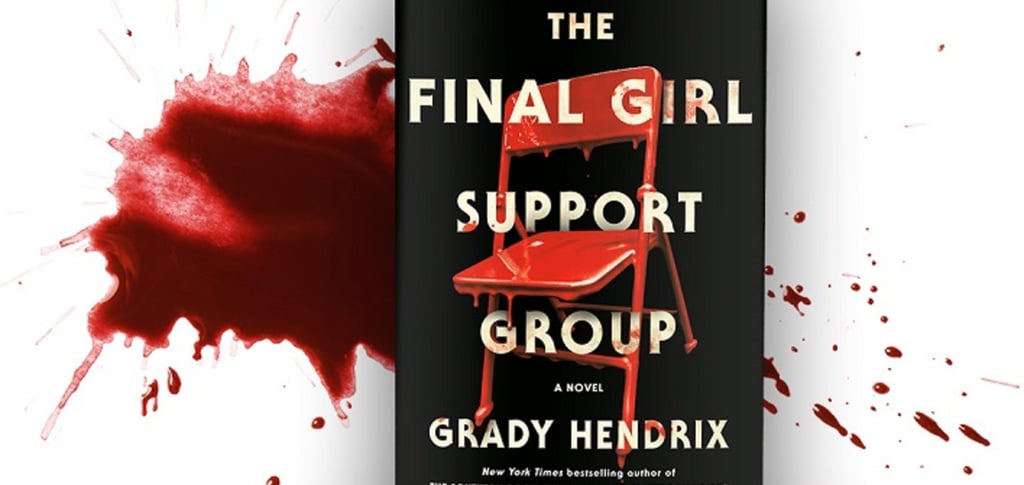Grady Hendrix’s The Final Girl Support Group: A Nostalgic and Thrilling Reinvention of the Slasher Genre
Dive into Grady Hendrix’s gripping homage to 1980s slasher films with The Final Girl Support Group. This blog explores how Hendrix redefines the iconic "final girl" trope, blending nostalgia, psychological depth, and contemporary themes of trauma and survival. Packed with relatable characters, fast-paced suspense, and a sharp critique of media exploitation, this thrilling novel is a must-read for horror fans and thriller enthusiasts alike.
BOOK REVIEWHORROR TROPES
Amber Dean
3 min read


Grady Hendrix’s The Final Girl Support Group: A Thrilling Tribute to 80s Slasher Films
Grady Hendrix’s The Final Girl Support Group is a spine-chilling homage to 1980s slasher films, blending nostalgic horror with modern psychological depth. This fast-paced thriller delivers an exhilarating mix of terror, trauma, and survival, making it a must-read for fans of horror novels, psychological thrillers, and anyone fascinated by the "final girl" trope. Hendrix’s ability to capture the raw intensity of slasher classics while weaving in contemporary themes of resilience and empowerment sets this book apart as a standout in the genre.
Reinventing the Final Girl Trope
Hendrix reimagines the iconic "final girl"—the last survivor of a massacre who defeats the killer and walks away, scarred but alive. In classic 80s slasher movies, the final girl often symbolized purity, strength, and resilience. The Final Girl Support Group dares to ask: What happens after the credits roll? This provocative concept drives the narrative, blending slasher nostalgia with a gritty exploration of PTSD, media exploitation, and survival.
The story follows a group therapy session for real-life final girls—women who survived mass killings and are now grappling with the long-term effects of their traumatic pasts. Each character is a loving nod to horror film heroines, from Halloween's Laurie Strode to Scream's Sidney Prescott. Hendrix doesn’t just rely on homage; he creates multidimensional, deeply relatable characters who feel alive and modern.
Plot Overview: A Suspenseful and Gripping Mystery
The novel’s protagonist, Lynette Tarkington, is a deeply paranoid and scarred survivor whose obsessive security measures define her life. Her fear becomes justified when one of the group members, Adrienne, is murdered. This shocking event propels Lynette and the others into a suspenseful race to uncover the truth as they realize someone is hunting them down.
Set against the backdrop of Los Angeles, The Final Girl Support Group masterfully balances heart-pounding action with reflective, emotional moments. Hendrix’s expert pacing keeps readers on edge, with each chapter delivering new twists and turns. The result is a tightly woven narrative that evokes the best elements of slasher cinema while subverting traditional tropes.
Emotional Depth and Relatable Characters
What elevates this novel beyond its blood-soaked premise is its emotional resonance. Hendrix’s portrayal of the final girls is both empathetic and raw. Each woman in the support group represents a unique facet of trauma and survival, from Marilyn’s struggles with addiction to Dani’s resilience as a queer ex-cop.
Lynette, the most tortured of the group, serves as a compelling and deeply human narrator. Her crippling paranoia, fueled by years of survival, makes her frustrating yet sympathetic. Hendrix portrays trauma with unflinching honesty, showing how it shapes identity and relationships. Lynette’s transformation from victim to empowered survivor forms the emotional core of the story.
The dynamics between the women are equally engaging. Their shared experiences bond them, but their personalities and coping mechanisms often clash, creating tension that feels authentic. Hendrix’s exploration of survivor’s guilt, exploitation by the media, and the commodification of their pain adds layers of complexity to the novel.
A Modern Take on Nostalgia
While Hendrix clearly adores 80s horror, The Final Girl Support Group is firmly grounded in today’s world. Themes of social media, surveillance, and true crime culture give the story a contemporary edge, making it accessible to both hardcore horror fans and newcomers to the genre. This balance between nostalgia and modernity ensures the book resonates with a wide audience.
Hendrix’s sharp prose and darkly humorous tone further enhance the story. His descriptions of violence are graphic but never gratuitous, maintaining the suspense without veering into exploitation. The dialogue is natural and witty, adding depth to the characters while capturing the absurdity of their situations.
A Reflection on Violence and Media Exploitation
Beyond its thrills, the novel offers a poignant critique of society’s obsession with violence and trauma as entertainment. The final girls’ stories have been commodified into movies, merchandise, and pop culture phenomena, stripping them of their humanity. Hendrix forces readers to confront the ethical implications of consuming such stories, blurring the line between reality and fiction.
Themes of Empowerment and Resilience
At its heart, The Final Girl Support Group is a story of survival and empowerment. Hendrix redefines the final girl as more than a passive victim—his characters are fierce, flawed, and determined to reclaim their lives. Lynette’s journey from fear to empowerment is particularly moving, showing that survival is an ongoing process, not a destination.
Conclusion: A Must-Read for Horror and Thriller Fans
Grady Hendrix’s The Final Girl Support Group is a thrilling, thought-provoking novel that reinvents the slasher genre for a new generation. With its fast-paced plot, relatable characters, and emotional depth, this book is a must-read for fans of horror novels, psychological thrillers, and 80s slasher films.
Whether you’re a longtime horror aficionado or new to the genre, The Final Girl Support Group offers a gripping, suspenseful, and deeply human story that lingers long after the final page. It’s a powerful reminder that while horror often celebrates violence, the real story lies in the strength and resilience of its survivors.
